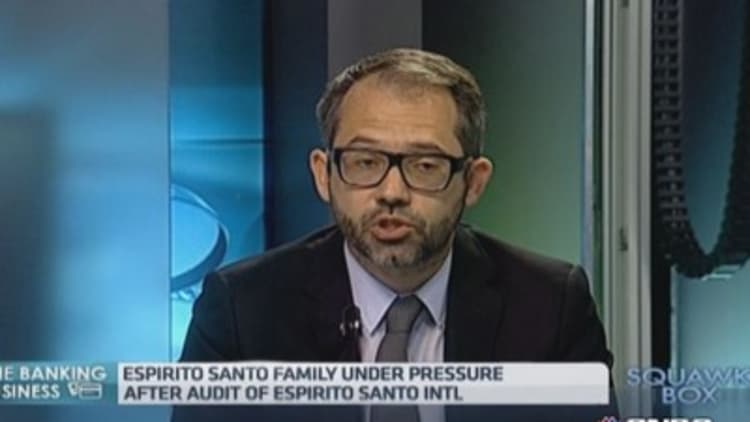The Portuguese bank that sent shockwaves across global markets in early July is set to release an earnings update on Wednesday - and if media reports are correct the results won't be pretty.
Portugal's Banco Espirito Santo (BES) saw its shares slip 4.9 percent on Wednesday to 0.32 euros ($0.43), a level not registered since Reuters began tracking the data in the mid-1990s.
Turmoil at the group which owns the bank has embroiled the lender for weeks, and former CEO Ricardo Salgado was arrested in connection a tax evasion and money laundering investigation.
Read MorePortugal's BES hits back–should we blame the parent?
This recent flare-up in tensions in Portugal saw its government bond yields spike and heightened concerns that the euro zone debt crisis was on the verge of returning.
What might happen?
Earlier this week, Portuguese publication Expresso said BES was likely to report a loss of around 3 billion euros, with earnings due out after the close of European markets on Wednesday. This loss would account for the debt liabilities of its parent companies, but would also be larger than its existing capital cushion of 2.1 billion euros.
Here's what's happening in Portugal
Portugal's central bank has iterated that a capital increase could be used to guarantee adequate solvency levels, meaning the lender may be able to use private funds to reinforce its position, rather than public money.

How did this all start?
The problems at BES began in May when BES' parent company, Espirito Santo International (ESI), received an audit by the country's central bank which showed "irregularities" in its accounts. The flames were fanned once again on July 10 after debt repayments to clients on commercial paper issued by ESI were delayed.
Shares of BES and another part of the conglomerate, called Espirito Santo Financial Group (ESFG), fell sharply on the news and trading in both stocks were temporarily suspended.
The ownership structure of the Espirito Santo group is complicated, and has exacerbated recent problems. BES' parent company, ESI, owns 49 percent of ESFG, which in turn owns 25 percent of the BES. Thus, any problems at BES' parent companies also cause issues for the Portuguese lender. Rioforte, which holds assets like real estate and healthcare, also holds a 49-percent stake in ESFG.
How did it spread?
Portugal Telecom has also been dragged into the turmoil. On July 16 it salvaged a possible tie-up with a Brazilian telecoms company after a possible default by Rioforte called the deal into question.
Read MorePortugal concerns compound global stock selloff
The problems at BES, which in terms of assets is relatively small compared to some super-sized banks in Europe and the U.S., managed to send tremors around the globe. Sovereign bond yields in Greece, Spain and Italy followed Portugal's higher, and global stocks, including those on Wall Street, were briefly hit on July 10, amid fears of contagion to other lenders.
BES shares are now down 40 percent since that date, during which time ESI and ESFG have both gained protection against creditors. Analysts at Citi maintained their "buy" rating on BES' stock in a research note on Tuesday but highlighted that the recommendation had a high risk and downgraded its target price to 0.58 euros from 0.65 euros.
BES stated on Tuesday that it had cancelled a shareholder meeting scheduled for Thursday after ESFG was granted the creditor protection.


